Last Updated on October 27, 2024 by Ellen
I walk the beach to get to the store. I’m going to buy more instant coffee with no sugar added. It’s what we drink these days. Drip coffee is nowhere to be found. Word is there’s a Starbucks inside the local airport, and the store might sell ground coffee beans, but I don’t think the airport is open yet. We traveled with a coffee machine as we made our way around the Philippines in monthly rental units on various beautiful islands since November. And now, the machine sits boxed, collecting dust and gecko poop that I sweep off almost every day.
The beach walk is typical. Today the tide is high. Some kids play in a fort near boats, beyond the spot I call ‘land of a thousand coconuts’ because there are many trees and empty coconut shells on the beach. The sand is looser, deeper in this spot. Here, a woman is caught in the sand with her motorbike. I push her out, trying to avoid the sand flying off her back wheel. “Thank you, ma’am!” – and she’s off into a beachfront homestead.
I keep going, not in a rush, but not looking for shells. Yet. Now I’m at the place I call the land of kids and their fort. The kids call out good morning to me. The oldest one calls me “Miss Everything” and I call him by the name he gave me: Guapa. Everyone knows everyone in this semi-rural area.
Today my plan is a little different. I usually walk by and keep going towards the end of the beach by the bridge, and get to the street on the public path. Occasionally, I go further and I sneak through an abandoned property and dawdle in what’s left of someone’s home. Seashells are everywhere, so I wonder if high tides and storms swamped it. In a pandemic, in a rural area of the Philippines, it reminds me man’s structures cannot contain Earth. Not really.
But today I want to get back to the street half way to town because this is the area where Wilson’s store is located on the street. I ask a girl about 10 years old if she can show me the way to Wilson’s store and home, and of course she can because everyone knows everyone, and she’s brave enough to take the white foreigner down the path close to everyone’s home.
She skips ahead and leads me from the beach to a path that looks more like it’s part of someone’s backyard; behind a wall; along the wall, we pass modest homes, women doing laundry, chickens and chicks everywhere, a few puppies, some trash piles; into a small alley; out onto the street. She points me to Wilson’s store, then walks me almost to it. She has not spoken English to me, though I know she must know a little. I thank the girl and study her face so I can remember her, and give her a lollipop or something the next time I see her.*
I chat with Wilson. He is fluent in English. On my first day out of quarantine, I stopped for a diet coke, but this isn’t the type of place where diet cokes are stocked. You get regular Coke or Mountain Dew – in a glass bottle. It was the best Mountain Dew I ever tasted. We laughed over that. Today, Wilson seems down. The pandemic has ruined his income, as it has for everyone in his barangay, or neighborhood.
We chat about the weather, whether it will rain, and if I might get caught in it. He offers an umbrella, I decline. I’m sweating like mad from the humidity and the rain will feel great. I hope it pours.
Wilson tells me about the fiesta that is to take place today in his neighborhood – but he thinks the looming rain and never-ending pandemic will put a damper on this year’s festivities. It’s an annual party for the neighborhood on May 18 – I don’t understand exactly why. Often in the Philippines, neighborhood celebrations and parties have something to do with patron saints, but that isn’t the case for today. I don’t press for an explanation.
He is out of the the baked biscuits I usually buy from him. I pay him for the usual four packets of instant coffee – with sugar — the equivalent of 50 cents. I don’t need these, but I need Wilson to keep smiling. I bid him well, and continue the rest of the way into town on the road, another half mile.
My next stop is to get the coffee I am really seeking on this trip – the Nescafe instant without sugar, margarine, or any other added filler. My husband Tedly and I prefer plain instant coffee in the morning. Since it’s a replacement for brewed coffee, I always add junk into anyway. Some chocolate drink powder and milk. I use the sugary coffee packs I buy from Wilson as afternoon pick-me-ups because the sun and sea make me tired by early afternoon.
I walk the road into Malay proper. It’s a large village, or small town. Really small. However, one can find basic supplies and friendly people. I go to the town’s largest mini-mart where I have seen sugar-free instant coffee on the shelf, but I’ve never bought it here. Usually Tedly picks it up in Caticlan on his supply runs.
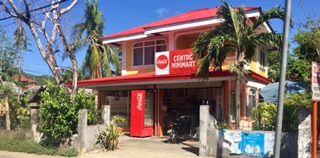
Inside, I buy two packages of plain instant coffee at 90 pesos each, or $1.80 each; a small jar of peanut butter for $1.10; a tall jar of mango pineapple jam for $2.60; a large package of plain crackers for $1.20. The clerk is happy to see me spend so much money – her smile is bigger than usual. I normally spend a few cents on things like small packs of laundry soap or hair conditioner, or apiece of a hard candy to suck under my face mask on the walk back. I buy these things because I want to be out doing something – not because I need them. Today is different. I need coffee. Even if it’s instant.
She puts my goods in a plastic bag. My eco bag is cloth and it’s probably going to rain. The sky is dark gray. Thunder is close. This is rainy season. We weren’t supposed to be in the Philippines now, but thanks to the ‘rona, here we are. I tuck the plastic bag of goods into my cloth sack and feel new weight on my shoulder for the walk home after quick stop in town.
I walk by homes, along the first bridge, and cut through the abandoned house property back to the beach. I don’t dawdle because it’s going to rain, and I want to look for shells. I enjoy this search and do it almost every day. I examine shells and rocks and sea creatures like snails and crab, and sometimes fish if they come close to the shore.
I flip shells with my toes to see if it’s worth it to bend down for further inspection with a sack on my shoulder. Snails move with their homes on their backs and leave trails in the sand. Light rain lands on my head. I keep looking. Hard rain hits my body. I keep looking. The raindrop ripples make it tough to clearly see specimens so I focus on what’s on the beach. I bend a lot – and it’s worth it because I find some keepers. I give the winners a seawater rinse and stick whatever caught my eye into my wet sack.
I mentally global hop:
- I’m on boat in Guatemala laughing at nothing.
- I ride a camel and camp in the Sahara.
- I’m in wagon in Cambodia and cows block the path.
- I watch rural landscapes whiz by on a high-speed train in Spain.
- I’m on a bus from Montenegro to Albania and the driver is smoking.
- I squeeze into a subway in Greece to go spend time with refugees.
- I’m in rhythm with motorbikes in a Vietnamese intersection.
- And here, now: I walk the beach looking for shells in the Philippines.
The most travel I will do this week is probably down the beach to Malay and back, and strangely, I’m OK with that. I’m changed. We are hunkered down for the coronavirus pandemic that is changing the world in ways most people cannot accept. Yet.
My global hop is over, and I have traveled back ‘home’. I go to the roof; place collected shells along the perimeter. No idea what I’ll do with them. When the power goes out again, I could make something with them. It will give me something to do with my hands. But it’s more likely I’ll throw them back to the sea when we eventually leave. Whenever that may be.

I look up information about my shells and starfish and coral. I recently found a dead starfish that’s nicknamed the ‘chocolate chip’ starfish, because someone thought it looked like chocolate chip cookie dough. I didn’t really see it. I guess the knobs might look like chocolate chips if you look fast – underwater. It was dead when I picked it up, but it’s changed color since then. Protoreaster nodosus is found in the water in this area of Earth, but I’ve never seen one underwater in the Philippines – only Indonesia.
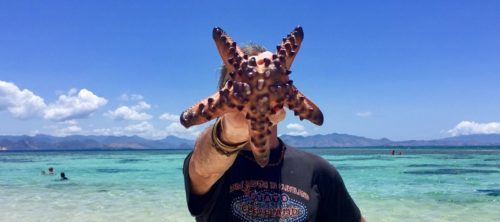
On another lucky walk a few days ago, I found a giant clam half-shell that might be older than the borders of Malay. There are eight species of giant clams found in the Philippines. I think this shell might be either the T. squamosa or the T. maxima species – it’s not too ‘giant’ and, actually, it’s rather ugly. The shell appears to have ridges similar to those species. But it’s impossible for me to determine the right species. It’s covered with fossils – older than the hills. Whatever the species structure – it’s useful to me today as the perfect hand weight for exercise. It probably weights just under two pounds.
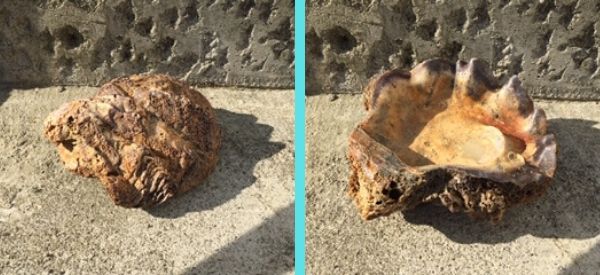
I lift the clam shell using the inside as a handle; slowly, slowly, work my arms. I look at the calm sea and Boracay Island in the distance. I count to 12, six times.
I watch the fish scout search for a school; I see three men row the narrow outrigger boat to the scout – it takes three rowers because the net is massive and heavy and the back of the wooden boat appears to be sinking. Two men with dive masks are in the water, ready to chase the fish into the net. People gather on shore to pull the net back to land, hopefully full of small fish for lunch and dinner. I put the clam shell down on the stairs to the roof and go back to the beach. I walk across rocks and shells. One of the rowers has started to drop the net into the water. The huge net must be at least an eight of a mile long. The men make a half-circle pattern against the shore – this will trap the fish. At each end, a rope on the shore, with which to pull the net.
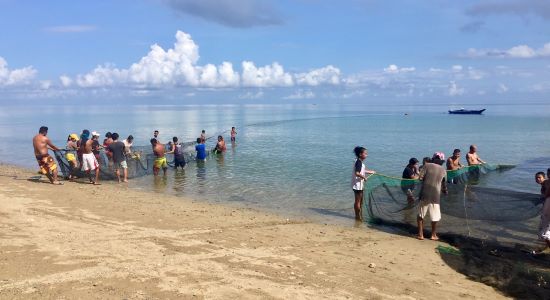
I go to the rope nearest me on the rocks and the sand and pick it up. I pull, and pull, and pull, alongside people who don’t have time to look up information about giant clams, or shuffle their toes in the sand flipping over shells. They don’t have time to walk a couple of miles to buy a sucker or hair conditioner because they just want to be out and about. They aren’t thinking about instant coffee with no sugar. These people are fishing to survive, pandemic or not. They were out here doing this before ‘rona rocked the world. And they’ll be doing this long after I’m gone… whenever that will be.
Their skin is dark brown because the sun is relentless and they in the sun, at the sea, in the sea. Their net is a temporary trap to see what the sea will give them to eat for free, to survive.
Pull, pull, pull – my hands are hot and raw from the rope and net. Sweat runs into my eye. My feet slide in wet sand. Tug of war with the life-giving sea. Pull, pull, pull. I hope it’s a large catch. The fish trapped in these nets are always small – sometimes measured by centimeters. But a big pile will no one around me will go hungry today. Everyone working on this pull will get a share of the catch. I will give my share back to the pot because I want them to have more.
Slowly, slowly, the catch comes into view. It’s large! Enough for everyone here to get a weighty pile! I am so happy about this, and I am happy I’m helping, slightly sore hands be damned. I imagine my hands will be strong, and my arms a little firmer, by the time we leave here. Whenever that may be.
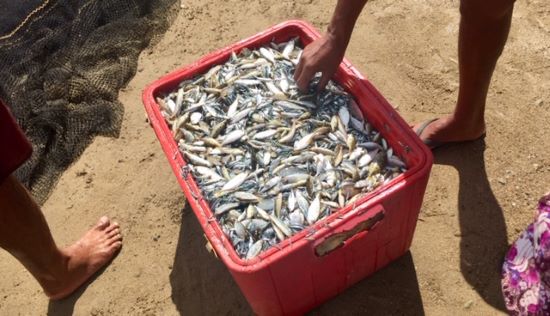
*Editorial note: The girl who led me to Wilson was Jannaira. She was nine years old at the time. Thirteen months later, I brought her a birthday cake and gifts during Malay Lockdown 2021.
Thanks for reading, “Narrative: 4 hours during the pandemic.”
Ellen wanted to do something different today.
Visit the special COVID-19 section for daily accounts of riding out the pandemic in the Philippines.
You might also like:


What a beautiful piece, Ellen. You took me there. How nice you are able to help with the fishing. Maybe you can stop “pumping” clam shells if you continue to pull the nets.
Thank you, Damian!
Lovely narrative.